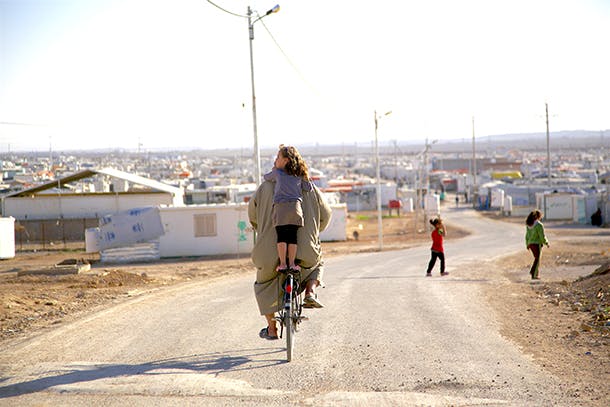
As the world marks World Humanitarian Day on August 19, I am thinking about the mother I met in Amman, Jordan. Forced to flee Syria, her husband has made the dangerous journey to Europe and she lives in a one-room apartment, struggling to provide for her children.
I’m thinking about the girls I met in the Zaatari refugee camp in Jordan. They’ve endured more than children should, yet their dreams for the future continue. One girl told us when she grows up, she wants to be a doctor to help heal people so they don’t suffer.
And I’m thinking about the United Nations humanitarian workers I met who are a lifeline for so many vulnerable families. Their dedication, hard work, and compassion make a huge difference – from offering services to comfort – to the 130 million people in need of humanitarian assistance.
Currently, the forces of inequality, poverty, climate change, resource scarcity, and disrespect for human rights – are leading to conflicts and disasters around the world that continue to produce humanitarian catastrophes that cause ordinary people to endure extraordinary hardship.
The people I met show the resilience of the human spirit – they continue to do whatever it takes for their families – yet the international community is not meeting its obligations to them. UN humanitarian appeals continue to be severely underfunded, humanitarian laws continue to be violated, and the number of people in need continues to grow.
It’s clear that the status quo will not suffice.
The UN and a number of governments, businesses, aid organizations, and civil society groups – as well as people affected by crisis – are pushing for change.
Last year, 193 world leaders adopted the Sustainable Development Goals, a 15-year development framework to end poverty, fight climate change, and address the root causes of inequality and instability.
Earlier this year, UN Secretary-General Ban Ki-moon released an Agenda for Humanity to outline key actions the international community must take to deliver for people affected by crisis.
In May, he gathered leaders from across the world and across sectors for the first-ever World Humanitarian Summit to launch new initiatives and new ideas to expand and improve humanitarian aid. From a new education fund for refugee children to a “Grand Bargain” to make aid more efficient and effective to an initiative to better engage businesses, the summit is helping spur further action on humanitarian response.
The dialogue started at the summit will continue next month at the UN General Assembly, where world leaders will gather for a high-level summit on refugees and migrants hosted by the UN General Assembly, followed the next day by a Leaders’ Summit on refugees hosted by President Obama and a number of governments.
These gatherings bring world leaders together to find ways to work together – and they help keep humanitarian needs on the global agenda. They are important; but so are results. In the coming months, we must ensure in that leaders to turn their commitments to action – and go even further to do more.
UN Foundation Founder and Chairman Ted Turner likes to say that everyone has a role to play in solving global challenges.
Governments should enhance their efforts to prevent and stop crises, build resilience, take action on climate change and sustainable development, and protect human rights. This means not cutting aid, but increasing it, and not allowing violations of international law and the targeting of innocent civilians and aid workers. Governments also need to increase their support for the host countries on the front lines of the refugee crisis.
Businesses can leverage their expertise, personnel, and resources to help get people in emergencies the tools they need to take care of their families. The good news is we’re seeing many great examples of this already happening.
The development and humanitarian communities can improve how they work together. When I visited with refugees, it was clear that basic aid like food and health care are vital; but they also want to send their kids to school and have a chance to earn an income and work. All of these things are important if we’re going to make sure that refugees and people in need of aid can live in dignity and move out of crisis.
Finally, citizens need to be involved. We need people everywhere to advocate, to donate, and to care. The refugees I’ve met shouldn’t be feared; they should be welcomed. They bring determination to communities to contribute and ensure their families thrive.
Behind all of the statistics on humanitarian emergencies are real people like the ones I met in Jordan. Let’s come together to make sure they aren’t left behind. As Archbishop Desmond Tutu has wisely said, “My humanity is bound up in yours for we can only be human together.”
[Photo: Patrick Adams]



 View All Blog Posts
View All Blog Posts